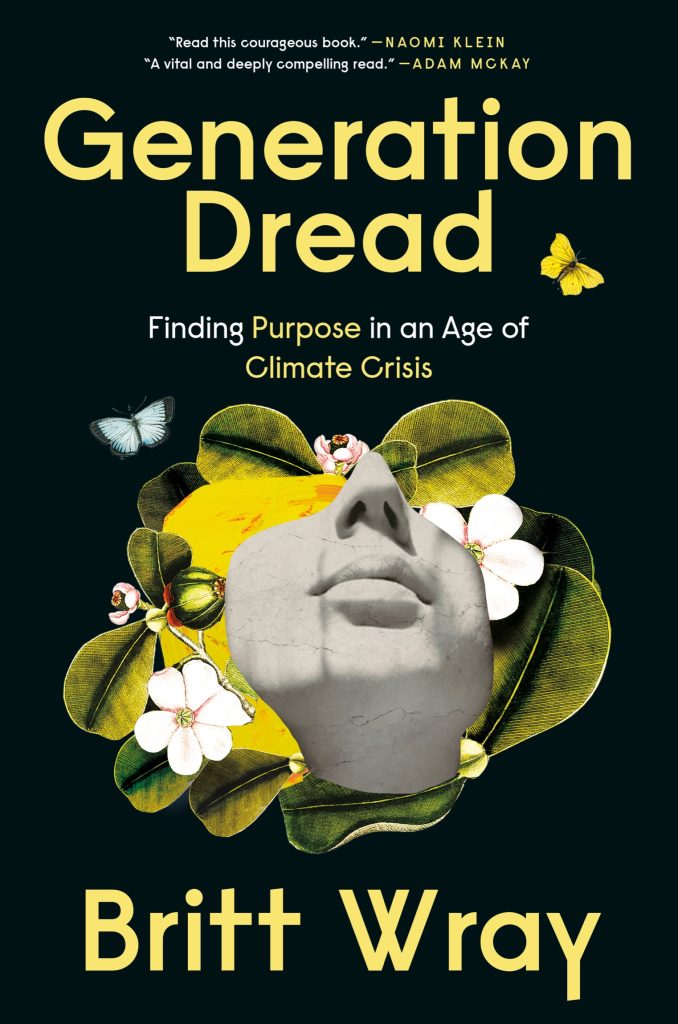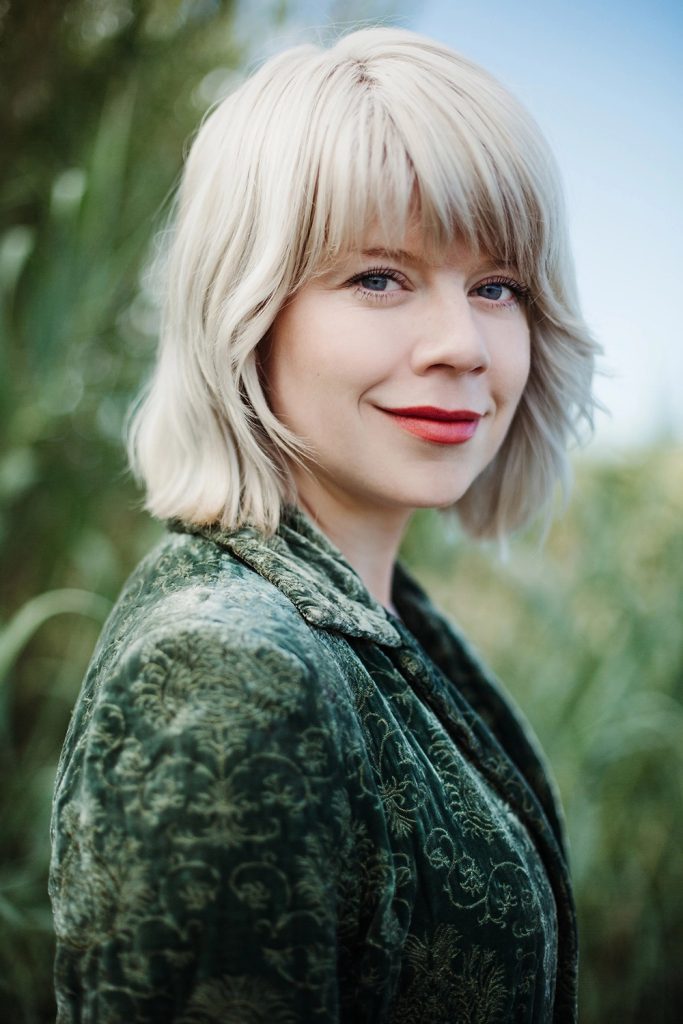![05news1[a]](https://chico.newsreview.com/wp-content/uploads/2022/11/05news1a-678x381.jpg)
Alongside global temperatures and sea levels, climate anxiety is on the rise, too, and according to author and researcher Britt Wray, the latter is “a natural and normal response to a dangerous situation.”
When climate anxiety and other environment-related emotions and fears are welcomed without judgment and not suppressed, she says, that’s when truly transformative work can begin.
There are “ways of psychologically adapting to scary realities that can help us become stronger, more connected, resilient individuals as we live in an era of climate crisis,” Wray told the CN&R via phone on a recent afternoon. Joyful and meaningful living is still possible even as we face the effects of climate change.
Wray is a Human and Planetary Health Fellow at Stanford University and the London School of Hygiene and Tropical Medicine—and in her new book, Generation Dread: Finding Purpose in an Age of Climate Crisis, she details social interventions and strategies to help people “extract meaning from this difficult experience” and “conjure existential courage and connection.” This was the subject of her Q&A at Chico State on Oct. 13, part of a free ongoing series of events hosted by Teaching Climate Change and Resilience, a faculty learning community created by the Campus Sustainability Office and Office of Faculty Development.
“The worst outcomes are not inevitable,” she writes in the book’s introduction, “and much can still be healed—but as emotions get bulldozed by world events and scientific predictions, the ability to create a more just and healthy world depends largely on how these difficult feelings are tended to. My hope is that by being explicit about these inequalities in Generation Dread, this book can contribute to us getting better at looking out for each other as things get harder and heat up.”
Wray’s research on climate change and mental health was motivated by her struggles with eco-anxiety in 2017, when she and her partner began discussing having a child.
“Almost overnight, I’d turned into that annoying person who manages to bring up climate trauma in every discussion,” she writes in her Gen Dread newsletter. “Congratulating friends who were newly pregnant became a tightrope walk tinged with tragedy. And when I cried about the climate, it hurt like the wind was knocked out of me. It was real deep grief, like someone I loved had died.”
Wray “became rather obsessed” with gaining a deeper understanding of what she was experiencing and why, and how she could validate it and cope. She wanted to do this not only for herself but for others suffering from climate anxiety who were also unsure how to handle it. That’s when she tapped into her skills as a science communicator, journalist and broadcaster.
“It’s been pretty head-spinning, actually, to see the need, the hunger for these resources that I was also desiring myself a couple years ago, just explode,” she told the CN&R. This path wasn’t one she planned for herself, “but it was really about following what felt deeply meaningful and urgent.”
At the Q&A event, Kim Michl-Green—a Chico State graduate who interviewed Wray alongside professor Mark Stemen, vice chair of the city’s Climate Action Commission—told Wray and attendees that she related with the intense feelings that prompted Generation Dread. Just before graduating with her degree in psychology, Michl-Green became increasingly conscious of the severity of the climate crisis, “talking about it constantly to anybody who would listen.”
She recalled a discouraging interaction with a teacher who dismissed her desire to discuss how depression and anxiety are related to the climate crisis. Michl-Green said she felt frustrated, helpless, apathetic and often betrayed by people in power, and she asked Wray for guidance: What would she say to students who are feeling the same way?
Wray replied: “You’re not alone. Students who feel this way are not alone.”
The author then pointed to disaster studies showing that humans can recover more quickly from acute trauma when they have strong social ties and a sense of connectedness where they live—and that belonging is “the antidote to the things that basically rip away our resilience.”
Social movements are how monumental societal changes such as women’s suffrage and the abolition of slavery happened, she added: “We have tools at our disposal, and they lie in community.”
Similarly, Wray encouraged educators to empathize with their students and validate the moral outrage they are feeling. It’s important that they “pierce the bubble of silence around the fact that [climate crisis] news carries this existential weight,” she said.

“People feel really strained and stressed by it, and we can’t continually deliver the science without addressing that,” Wray continued. “Therefore, shifting educational norms, talking about emotional coping tools, talking about mindfulness, mediation, yoga, gratitude, forms of community building, contemplative practices—things that have always helped humans co-exist with difficult realities—are needed in environmental science spaces.”
Putting in the work together
The day Wray spoke with the CN&R, her eco-anxiety was pretty much in check, she shared—she’d been speaking with colleagues about the topic and examining it from her lens as a researcher.
The importance of connection and a shared community highlighted in her talk is also a central theme in her book.
“It’s a form of meaning-focused coping—being able to see others and surround myself with people who are similarly resolved and convicted is super strengthening. It fights this feeling of helplessness and powerlessness, which breeds inaction on the climate,” Wray said. “It is really uplifting and hopeful even in the midst of devastating evidence. Without that, it’s hard to feel one’s actions do matter, if you’re swimming out there alone and not connected to others who are similarly doing the work. … which is why it’s really important to find community, no matter where you are, to be able to take on some of these actions.”
While it’s difficult for humans to sit with discomfort, she continued, “that is really our task in this crisis—to get more comfortable at being uncomfortable” and transform those emotions into a courageous commitment to climate work.
It’s certainly not easy work—as Wray writes in Generation Dread, “facing your fears and authentically committing to the belief that it isn’t too late to strive for better futures is long and exhausting work that requires all forms of care.”
But it’s work that will lead to a greater wellbeing.
“We are here for a brief moment of time and can maximize our experience of this in many ways, including through climate work,” she said. “While the situation is not good and not ideal, it’s not the worst case scenario of what we can be facing, and we are in a game of preventing harm, which is always worth it.”
Wray’s advice for those wanting to do what she calls “the work of our lifetimes” is to take personal stock and find where they fit.

“These kinds of explorations of what brings us love, power, joy … [and] making the most of our time [here] are important ingredients for identifying the type of work we’re going to do with others.”
That’s how Wray found herself at the forefront of this work, which has helped her learn how to manage her eco-anxiety while proving both personally and professionally fulfilling.
“It’s very rewarding when people reach out who say that the work I’m putting out has helped them understand what was formerly making them feel insane,” she said. Stanford has embraced her research in this burgeoning field of study, she added, and is “really taking it seriously.” Through this work, she and her team have engaged in activism-based scholarship, expanding upon the traditional lane of a researcher into one who connects with policy makers, politicians and media.
She and her partner, Sebastian, decided to become parents, and Wray says she does have hope for her son’s future and the future of his generation. Generation Dread was one of her first gifts to him.
“To Atlas,” she writes, “and every soul who is overwhelmed by this crisis yet refuses to look away.”
Read it: Visit brittwray.com to find out more about Britt Wray and her latest book
Editor’s note: This story is an updated version of a preview originally posted Oct. 12, 2022.

Be the first to comment